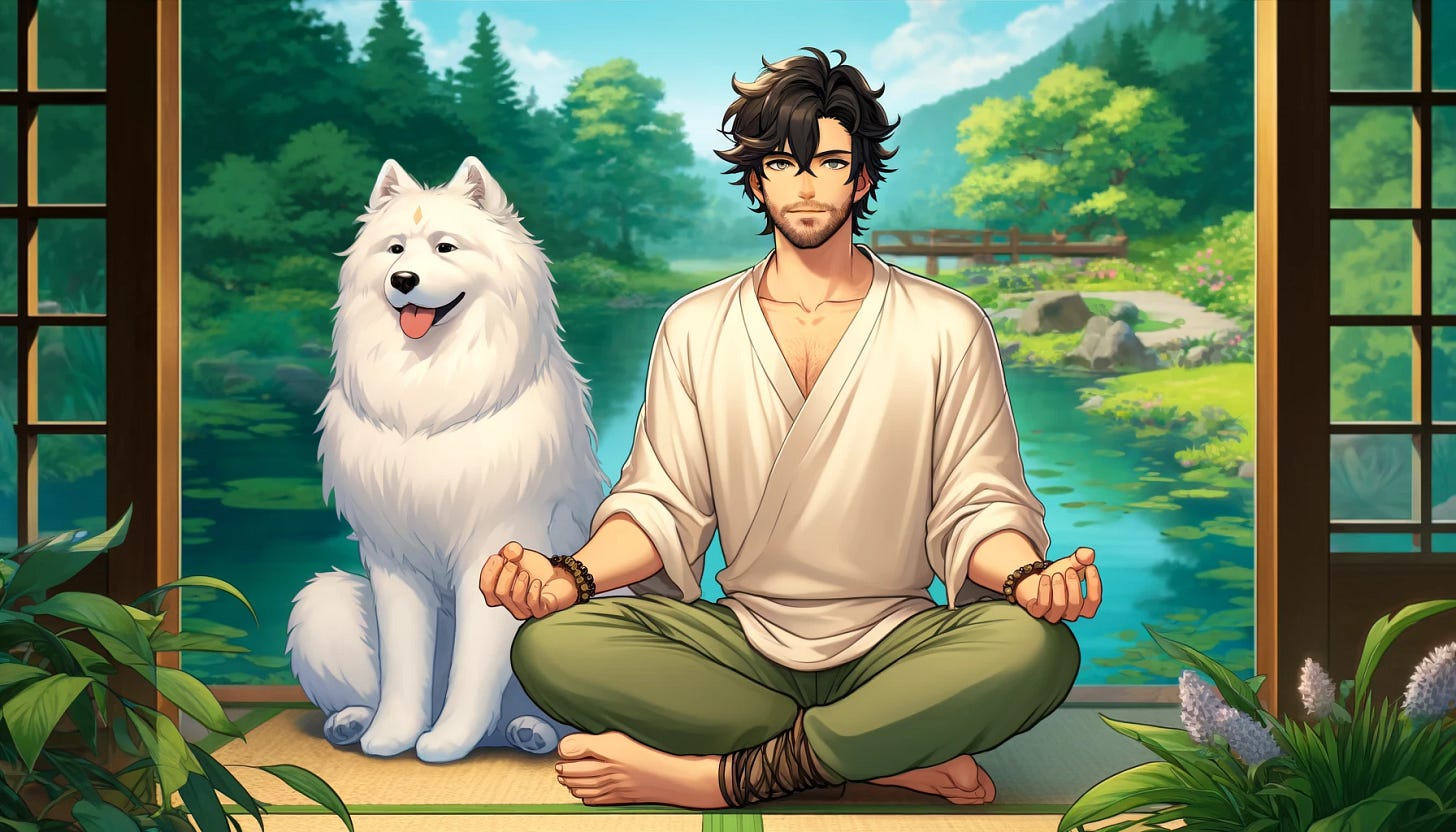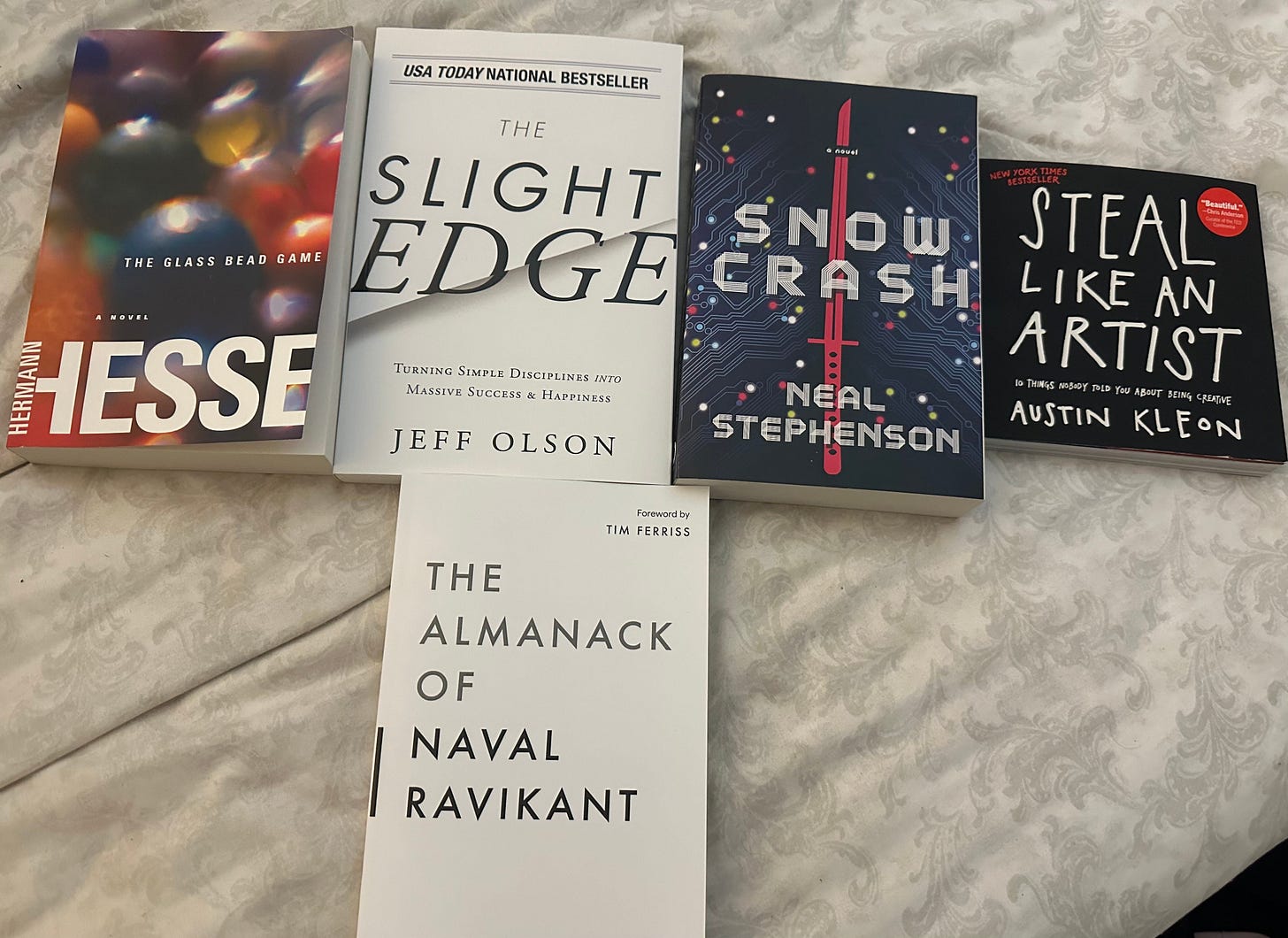Am I really the one I've been looking for?
Five strategies to find what it means to 'be yourself'.
Just be yourself…or else!
“I’m worried about you.”
Here I was in all my arrogant glory: Wildly Loud; Embarrassingly Cocky; Unforgettably Insecure.
My second Existentialism class of the semester had just ended. People hung around after to discuss the lesson from that day. I hung around after to pursue the pretty blonde.
“I’m worried about you.” This bizarre and absurdly eccentric professor walked right up to me after class that day. He stood at around 5’4”, didn’t really take care of his appearance, and had a lazy eye. For reference, I’m a 6’3”, 200lb+ male.
As he was looking at me with his one good eye, he corrected his lazy eye to look straight through my soul and say, “I came over to kindly ask you to drop my class.”
Every muscle in my body was tense and it felt like what I can only describe as ‘negative electricity’ rapidly coursing through my body. I was horrified. My ego thinking: ‘who the hell are you to worry about ME’. (Translation: ‘Please don’t say anything that implies there’s something wrong with me. I am so fragile that any negative description of me that doesn’t fit my current view of reality will shatter me’.)
“But”, he continued, “I saw something in you today that made me change my mind”. He walked off without another word. He walked off like he hadn’t just filled me with darkness only to bathe me in sunlight.
The part of myself that existed beneath the facade I presented to the world was completely entranced. ‘What did he see in me?’ ‘Was it something I said? Something I wrote?’ ‘Was it the smooth sugar I was dropping on the pretty blonde?’
‘……………….somebody actually sees something in me?’.
Thus began one of the most positive relationships of my life. The feeling of this revered figure, who I admired tremendously, taking an interest in me, was beyond new to me. He became both my mentor and something akin to a father figure. We spoke almost every day while on campus. He made so much time for me and we continued to speak multiple times a year for the next thirteen years. I’m the person I am today largely thanks to him. He taught me that it was okay to be myself. (Rest in peace, Kerry Dugan, I’ll never forget what you did for me).
I grew up in a pretty chaotic haze. My parents came here from Syria when my mom was around six months pregnant with me. In fact, our WHOLE extended family moved here within a year of each other (such an Arab move). I was a very sensitive kid. Chaos at home was not an environment I could thrive in. There was always shouting. If I did something wrong, I was at risk of:
Being called a piece of shit
Being hit until the adult or my brother had their fill
Being threatened with abandonment
Being called the whole extended family’s title for me: stupid. Technically, it was ‘hmar’, the Arabic for ‘Donkey’, but that’s what I got. My aunt would always laugh and say ‘Nur, nobody expects anything out of you, we know you’re a hmar’.
I don’t write these words lightly. I’m not interested in demonizing my family. They’ve all (mostly) blossomed into amazing people. I’m not interested in pity. I deeply love and am so, SO, proud of the human being I am today. I’m simply setting the stage.
My upbringing was very much: America outside, conservative Muslim home inside. There were so many things I was interested in pursuing but the voice in my head had no problem reminding me: ‘You’re Muslim. If you do this, you’ll burn in hell.’
At school, I was teased for having a different name, being Arab, being poor, you name it. Home certainly didn’t feel safe and school, throughout my k-12 education, felt like I was walking into a minefield every day.
As kids, we’re evolutionarily inclined, for our own safety, to adapt to these situations in any way we can. For me, it was perfectionism, people pleasing, and being on guard every second of every day. I was constantly searching for the right thing to do or say to make sure I didn’t ruffle a single feather. It was no way to live and I had completely shrouded myself in inauthenticity in order to survive.
I remember just consistently feeling paralyzed. I remember once when a joke was told in class, everybody laughed, but I was way too much a prisoner in my anxiety ridden cage to share their response. That’s when I started to notice: I’m not having the same reactions to situations and conversations that everyone else is having. They had a levity to them that I learned to deeply envy.
Just be yourself!
I was angry and envious ALL the time. The only place I ever felt at complete ease was exercising with music on. I was able to daydream on full blast and it was the escapism I became addicted to.
A lot of the media I was consuming revolved around a main character who started out as an outcast and slowly built himself up. He’d become beloved and with a plethora of friends. In my young mind, I assumed this is how life was supposed to be. Why didn’t I have that? Why couldn’t I form the relationships I so desperately needed? I had a girlfriend. She was 23, I was 15. It wasn’t enough to satisfy what I was looking for.
“Find the courage to be authentic. Not everyone will like you, but no one can if they don’t get a chance to know you.” - Lori Deschene
When I turned 17, I absolutely blossomed. I would be called ‘beautiful’ by strangers at least twice a day. My newly deepened voice dubbed me the nickname Barry White. I grew to 6’3” and was muscular thanks to all the exercise - active day dreaming did me good! I was finally getting approval from my peers. In fact, I became addicted to it.
If I didn’t get those compliments, I would fish for them. If I didn’t get those compliments, I would spiral. I had no internal system of approval. I deeply relied on other people and willingly gave them complete power over me.
Why let other people have any power over you?
There was this person trying to burst out of me but I would use all my power to reject and repress him in favor of conformity.
I just couldn’t do it anymore.
I began a mission to learn how to be myself. It involved hundreds and hundreds of books, multiple therapists, my aforementioned mentor, meditation and yoga classes, you name it. I dove right in with everything I had. I had a problem to solve, and that problem was me.
Just be yourself!
Growth is never linear, and it certainly takes MASSIVE effort to make real, sustainable change, but learning to live a life of authenticity in a way that honors me every day has been one of the best experiences of my life and I want to share that knowledge with you. Here’s what I found to work best for me:
1. Acceptance
Dialectical Behavioral Therapy, DBT, is absolutely genius. Its approach uses dialectical philosophy - a very Socratic approach (I’m an ex-academic philosopher and geek the hell out about this stuff).
Dialectical implies the ability to hold two opposing truths in our mind at once and learn how to integrate them. It’s the synthesis of opposites.
On one hand, we need to accept ourselves as we are right now. On the other hand, we have the desire to change and grow to make our lives better for ourselves. Seemingly two opposing truths, right?
The way we would go about it is accepting ourselves as we are right now. The human being we’re accepting is also someone who wants to change and grow.
Have you ever loved and hated someone at the same time? Same idea.
We’re able to find a balance between the two and see where we can employ the method elsewhere. It’s extremely beneficial for any of us to learn how to hold two opposing truths in mind. It’s also extremely beneficial to think more in the gray area. There’s a lot of nuances and complexities involved in situations that we would miss otherwise. Things don’t have to be, and are rarely, so black and white, either/or.
"The privilege of a lifetime is to become who you truly are." - Carl Jung
2. Cheese and rice! Stop being so nice.
How many times have we been in situations where we choose inauthenticity just to make sure we don’t ‘ruffle any feathers’. How many times have we said yes when we really wanted to say no?
It’s funny, there’s times where I would say an opinion I thought someone would want to hear, only for them to disagree with me and state the opinion I ACTUALLY HELD.
How can we form a genuine bond with someone who never expresses their honest feelings and opinions? If that person is us, how can we develop healthy boundaries if we allow others to step all over us?
It lacks authenticity. It is absolute fodder for resentment. It’s a setup for self-neglect. I was once meditating in a sauna, having the time of my life. A guy walks in and starts pouring eucalyptus on the stove and it just absolutely blinded me. It’s such a sharp, unpleasant sensation when it gets into your eyes. There are times where silly things like this wouldn’t bother me and I’d let it go. Not this time. I lit him up because in the moment, I felt disrespected and had to deal with it in my way. I could have just smiled and said no big deal. I could have just let it go. In the moment, though, those options would have been inauthentic to me.
Remember, it’s micro choices that we deal with every day. Choices that require us to honor ourselves. The more we choose authenticity, the more authentic we become.
3. Resentment and Responsibility
The amount of resentment we carry is wild. Even more so, we aren’t even aware of it. You ever think back on a memory and feel flooded with negativity? What about a memory about a specific person?
I would get caught in daily cycles of thinking of someone from my past and not enjoying how I felt. ‘Fuck them, they fucked me over’ yada yada yada. When we have a laundry list of resentments, we aren’t taking responsibility for our side of things. Why don’t we hold ourselves accountable? Well, it’s because it’s extremely challenging.
It requires us to dig deep to confront memories and feelings we’d likely rather repress. Not only that, but we have to confront them while admitting that our side of the street isn’t clean, either.
You aren’t going to be capable of authenticity if you do not have the courage to face these feelings. Why let other people have any power over us?
"Holding onto anger is like drinking poison and expecting the other person to die" - Gautama Buddha
*SEE END OF LETTER FOR AN EXERCISE
4. Vulnerability and Courage
It takes tremendous courage to let ourselves be seen. It’s funny, a lot of us choose to bury the shame and embarrassing moments deeply so no one finds out about them. After all, they’re shameful and embarrassing! Why is that funny? Well, the antidote to toxic shame is sharing our shameful experiences and moments of embarrassment with others that we trust. Our friends will almost always offer empathy over the situation. We’ll have a good laugh about the whole thing and that’s that.
Once we’ve laughed about it, once we’ve received empathy from another person, the toxic shame doesn’t seem nearly as bad as it did a few moments ago.
It’s so challenging to get to a stage where vulnerability is second nature to us. It really does require an immense amount of courage. When opening ourselves up and allowing ourselves to be vulnerable, we face:
A fear of uncertainty and the unknown
Fear of being judged
Fear of rejection
Fear of being perceived as weak
I’ll be straight with you, none of these are easy to face. At first, anyways. It’s a muscle just like anything else in our brain. The more we practice vulnerability, the more courageous we become. The more we practice vulnerability, the more the world gets to see the real us.
“Choosing authenticity means cultivating the courage to be imperfect, to set boundaries, and to allow ourselves to be vulnerable; exercising the compassion that comes from knowing that we are all made of strength and struggle; and nurturing the connection and sense of belonging that can only happen when we believe that we are enough.” - Brene Brown
5. Mindfulness and Silliness
Do not take yourself so seriously.
The self-imposed toxic stress is absolutely terrible for us. It doesn’t even help us preform. Sure, we might trick ourselves into believing it does, but it does not.
The overly self-serious person is controlled by their anxiety and stress. Can you be authentic if anxiety is steering the ship? Do we make better choices when we’re in a state of anxiety or a state of calm?
There’s zero net benefit to it. ZERO. There’s a plethora of negatives, though.
It’s okay to play and have fun. It’s okay to sit around and watch silly comedies instead of the latest art house movie. Honoring our authenticity means honoring our inner child, as well.
Learn to laugh at yourself! As I said, I grew up in a very chaotic little world. I was constantly laughed at, and I learned to HATE being laughed at. If I was being goofy and doing a dance at a wedding and people were looking at me and laughing (the intended purpose of my dance), I’d suddenly feel myself tighten up, my brow furrowing, and a sudden need to just not be seen.
See how my authentic self-wanted to dance and goof around, whereas my trauma / anxiety response didn’t allow it. When these things happen, I find it extremely beneficial to employ mindfulness to help me get back to being myself. I could close my eyes, watch what my thoughts were telling me, and breathe myself back into reality. I’m personally a fan of 4/7/8 breathing as it seems to have had the strongest impact on my life. I’ll show you how to do this below.
Keep on keepin on. We’re all just trying our best and it’s important to remind ourselves of that every now and again. We got this.
I’d love to hear how y’all deal with shame, uncertainty, guilt, and the fears of rejection and being perceived as weak, below in the comments!
RESENTMENT EXERCISE:
Exercise: Take out a piece of paper and write down the first resentment you think of. On one side, write their name (Paul for our example). On the other side of the sheet, write your name (Nur). On Paul’s side, write down what Paul did that’s making you hold onto this resentment. Next to it, write WHY it bothers you so much. Did it affect your self-esteem? A financial prospect? Your emotional security? Next, head over to the column with your name (Nur) and write what your part of it was. It takes two to tango. What was your part in this situation?
I’m thoroughly convinced that resentment is an expression of fear. After you’ve completed the previous part, it’s time to do what I call a ‘fear chain’. For the sake of the example, I resent Paul because he stole all my Pokémon cards.
I resent Paul because I have fear: fear that I won’t be able to get cards like that again, fear my friends won’t want to hang out since I can’t play Pokémon, fear that I won’t be able to make new friends, fear that I’ll end up alone.
I’ve dissected it to a point that’s way more manageable: I resent Paul because I’m afraid of ending up alone. From there, you can work on letting it go for the sake of your own happiness and tranquility.
BREATHING EXERCISE:
4/7/8 - Inhale for four seconds, hold for seven seconds, exhale for eight seconds. Do this 4 times a day to get in the habit of using it. It works to activate our parasympathetic nervous system, the ‘rest and digest’ mode, and leaves us feeling noticeably more at peace.
June book haul! I’ll be trying to finish these this month. Excited to dive in. Bonus cat magnet bookmark haul. Absolutely nuts:










Beautifully said, Nur. Our parents didn’t know better. But we are gifted enough to have access to find help and heal ourselves. I can see you have done so much work on yourself. Happy to find someone who has been in the same path as I’m in now.
Great writing Nur! It sounds like you've actually "done the work" rather than just throwing out words--refreshing. I've found my root to also almost always be "fear to end up alone".